This article shines a light on seven wonderful benefits of school-based Applied Behavior Analysis (ABA) therapy for children with autism. These include better communication, enhanced social skills, and improved academic performance. These positive outcomes come from structured interventions and the teamwork of therapists, educators, and families, all working together to create a nurturing environment that supports individual growth and long-term success.
Let’s explore this together! By understanding these benefits, parents can feel more connected and empowered in their journey. It’s all about fostering an atmosphere where children can thrive and reach their full potential. We’re here to help you every step of the way!
The landscape of education for children with autism is evolving, and school-based Applied Behavior Analysis (ABA) programs are leading the way! These tailored interventions not only tackle the unique challenges that students on the spectrum face but also open up a world of opportunities for academic and social growth. As parents and educators search for effective strategies to promote independence and improve learning outcomes, a key question arises: how can school-based ABA truly make a lasting impact on the lives of these children?
Let’s explore this together! This article dives into the multifaceted benefits of school-based ABA, revealing how it equips children with essential skills and prepares them for a successful future. We’re here to help you every step of the way!
At Rori Behavioral Innovations Inc., we understand the unique challenges that parents face when supporting their children with autism. That’s why we’ve developed an extensive school based aba program specifically designed for educational settings. Our goal is to ensure that kids receive the essential support they need to thrive both academically and socially.
By blending data-informed approaches with a caring touch, Rori Care empowers educators and parents to create an inclusive learning environment. This is a space where development and autonomy can flourish for individuals on the autism spectrum. Exciting advancements in school based aba therapy have made it even more effective in schools, resulting in impressive improvements in communication, social interaction, and academic performance.
Experts agree that structured interventions, like Discrete Trial Training and Natural Environment Teaching, play a crucial role in creating meaningful learning experiences. At Rori Care, we believe in a collaborative approach. Ongoing communication among therapists, educators, and families ensures that each child’s unique needs are met. This teamwork leads to the successful implementation of school based aba strategies in schools.
As a result, young individuals not only achieve better academic outcomes but also develop essential life skills that prepare them for future success. Let’s explore this journey together, and remember, we’re here to help you every step of the way!
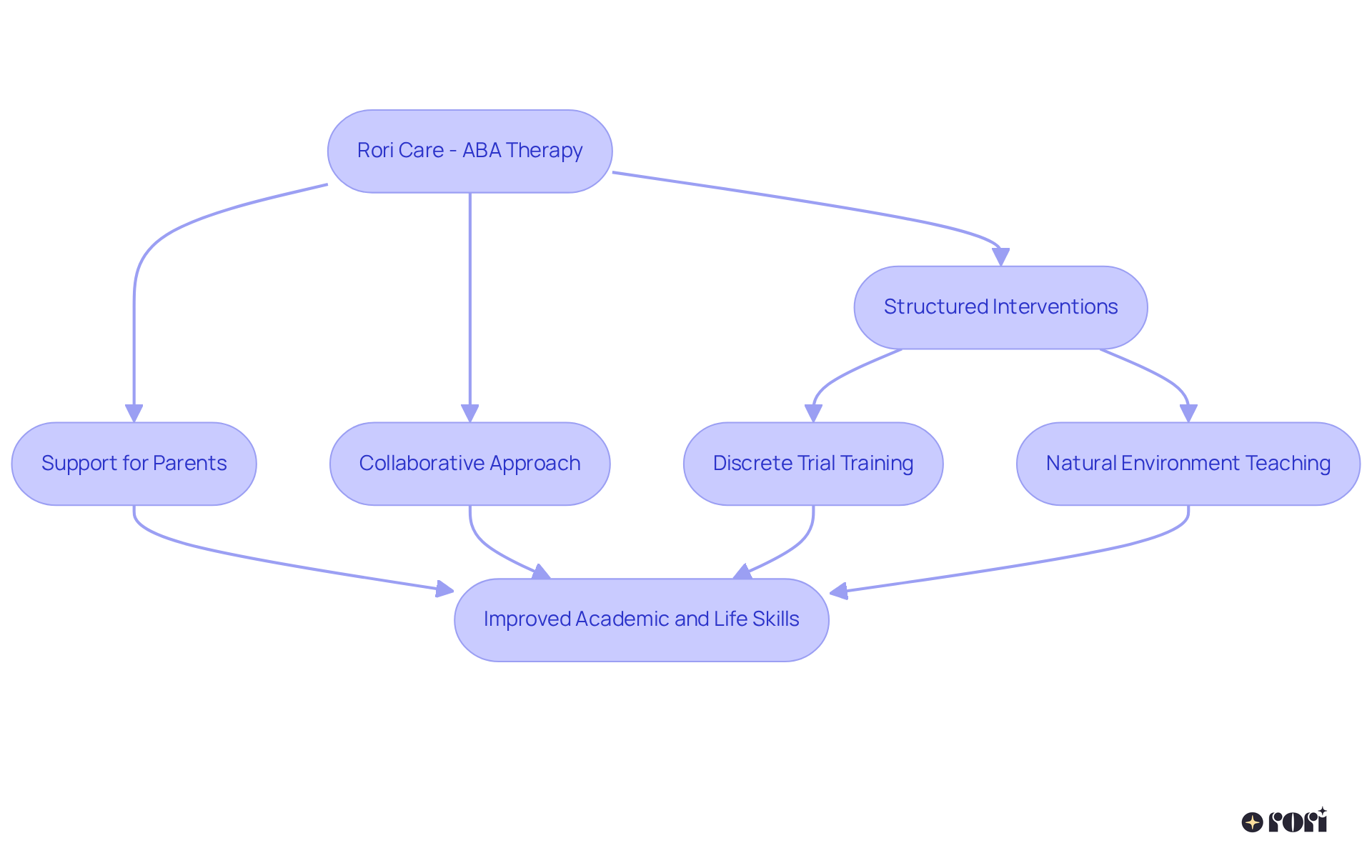
Personalized treatment plans are at the heart of effective ABA intervention. Every child with autism has their own unique strengths and challenges, which means we need a tailored approach. At Rori Care, our experts take the time to conduct thorough evaluations, creating individualized strategies that focus on specific behavioral goals. This ensures that the treatment is not only relevant but also truly effective.
This personalized strategy does more than just enhance engagement; it also fosters meaningful progress across various developmental areas. We understand that navigating this journey can feel overwhelming, but remember, you’re not alone! Let’s explore this together and find the best path for your child.
ABA treatment plays a vital role in helping children with autism gain independence by teaching essential life skills. Therapists use techniques like task analysis and positive reinforcement to break down complex tasks into manageable steps. This organized approach not only helps develop crucial skills like self-care and communication but also builds a sense of accomplishment and confidence in young individuals.
For instance, kids who undergo intensive ABA intervention for two years or more often show significant cognitive improvements, enhancing their ability to navigate daily challenges. Plus, research shows that children who start treatment early are more likely to develop functional communication skills, which are key to fostering independence.
By focusing on personalized support, ABA treatment allows young individuals to thrive in their daily activities, leading to greater independence and a better quality of life. Early intervention is especially impactful; it can save about $1.3 million per person over their lifetime by reducing the need for long-term special education and intensive care. As Yitz Diena points out, early intervention gives children the opportunity to develop and enhance vital skills during their formative years.
Let’s explore this together! We’re here to help you every step of the way!
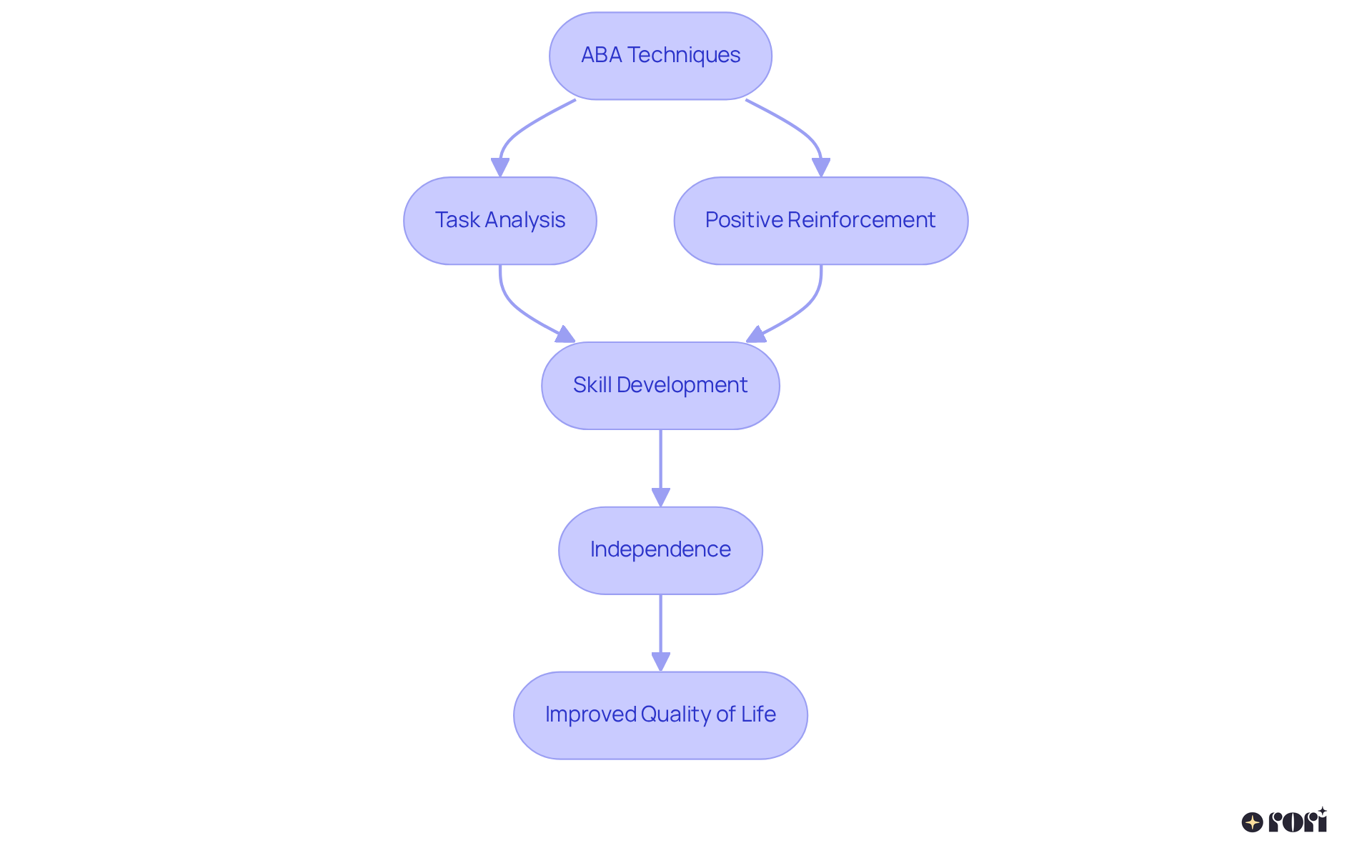
School based ABA intervention offers fantastic benefits for reducing behavioral challenges in children with autism. By using evidence-based strategies, therapists work closely with students to pinpoint behavioral triggers and create effective coping mechanisms. This proactive approach not only helps minimize disruptions in the classroom but also nurtures a more positive learning environment for everyone involved.
As kids learn to manage their actions better, they become more engaged and receptive to educational support. For example, consider Heather, a third-grader whose teacher, Ms. Reyes, set specific goals to enhance her classroom behavior over nine weeks. With targeted interventions like specific praise and clear classroom rules, Heather showed remarkable improvements in her conduct.
Research also shows that tools like the electronic daily behavior report card (eDBRC) can significantly reduce non-compliant, off-task, and disruptive behaviors. This highlights the effectiveness of structured behavioral management strategies, such as school based ABA, in schools. Overall, incorporating school based ABA practices not only boosts individual student outcomes but also contributes to a more uplifting classroom atmosphere. Let’s explore this together and see how these strategies can make a difference!
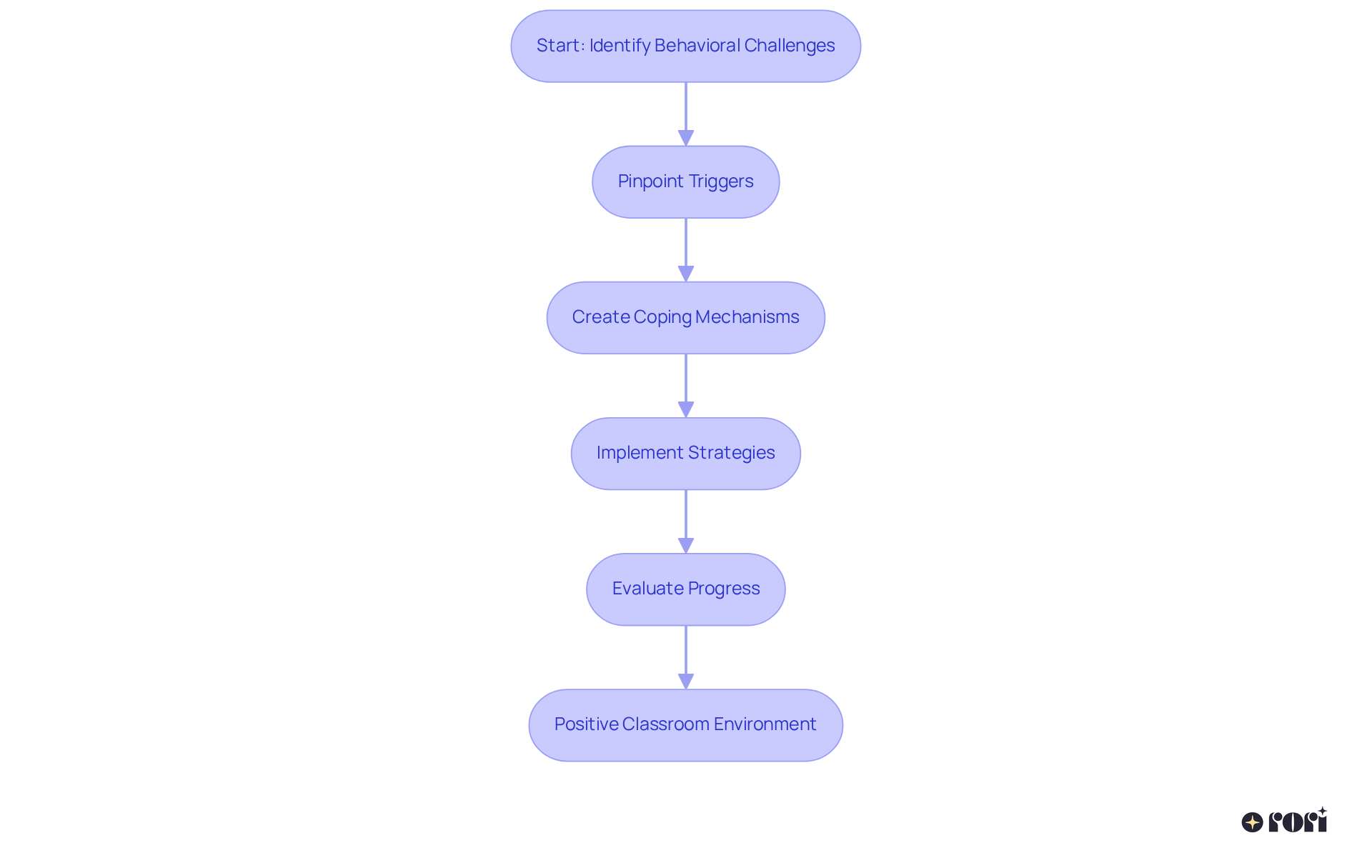
Social abilities training plays a vital role in ABA intervention, helping young individuals with autism build meaningful relationships with their peers. Through fun activities and role-playing, kids learn important social cues, how to take turns, and effective communication strategies. This training not only improves their interactions with others but also boosts their confidence in social situations, leading to better relationships and a greater sense of belonging.
Let’s explore this together! Imagine your child engaging in a role-play scenario, practicing how to start a conversation or share a toy. These moments can make a world of difference. By enhancing their social skills, we’re setting them up for success in forming friendships and feeling included.
We’re here to help you every step of the way! With the right support, your child can thrive socially, gaining the confidence they need to connect with others. Together, we can navigate this journey and celebrate every small victory along the way!
School based ABA treatment can significantly impact academic achievement for kids with autism! 🌟 By focusing on essential skills like attention, task initiation, and following instructions, it helps them thrive. Therapists implement school based ABA strategies, such as positive reinforcement and structured routines, to guide students in developing effective study habits, which boosts their overall engagement in the classroom.
This kind of targeted academic support, such as school based ABA, not only improves learning outcomes but also prepares children for future educational challenges. Isn’t it wonderful to think about how these strategies can help our kids succeed? Let’s explore this together and see how we can support them every step of the way!
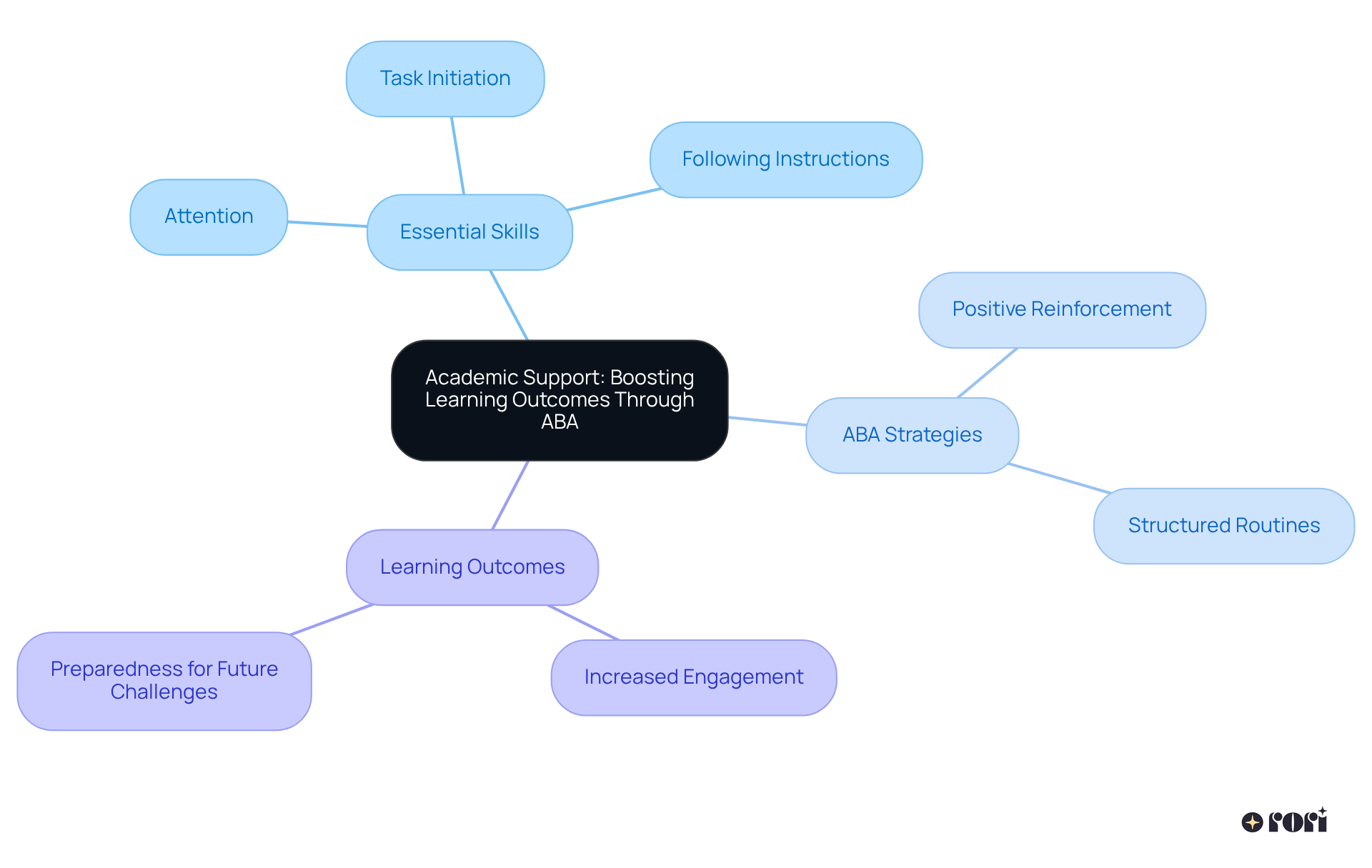
Family participation is truly a cornerstone of effective ABA intervention! By actively engaging in the healing process, families can really strengthen the behaviors their child is working on and offer steady support at home. At Rori Care, we believe in collaboration between therapists and families. We provide training and resources to empower parents in their child's development. This teamwork not only makes treatment more efficient but also creates a warm and supportive atmosphere that encourages long-term success.
Let’s explore this together! When families are involved, it fosters a sense of belonging and shared understanding. Imagine the impact of working hand-in-hand with your child's therapist! You’ll find that this collaboration helps everyone feel more connected and supported. So, if you're looking for ways to enhance your child's progress, remember that you’re not alone. We’re here to help you every step of the way!

Data-driven progress monitoring is such an important part of ABA therapy! It helps therapists assess how well interventions are working and make any necessary adjustments. By gathering information on a young person's behaviors and responses, therapists can keep track of progress over time, ensuring that treatment plans stay aligned with the individual's changing needs. This evidence-based approach not only enhances the quality of care but also gives families clear insights into their child's progress. 😊
Think about it—when you see measurable progress, it can really boost your confidence in the therapy process. Knowing how your child is doing helps you feel more connected and informed. Plus, it’s reassuring to see that the treatment is tailored to meet their unique needs. So, let’s explore this together and see how data-driven monitoring can make a difference for your family!
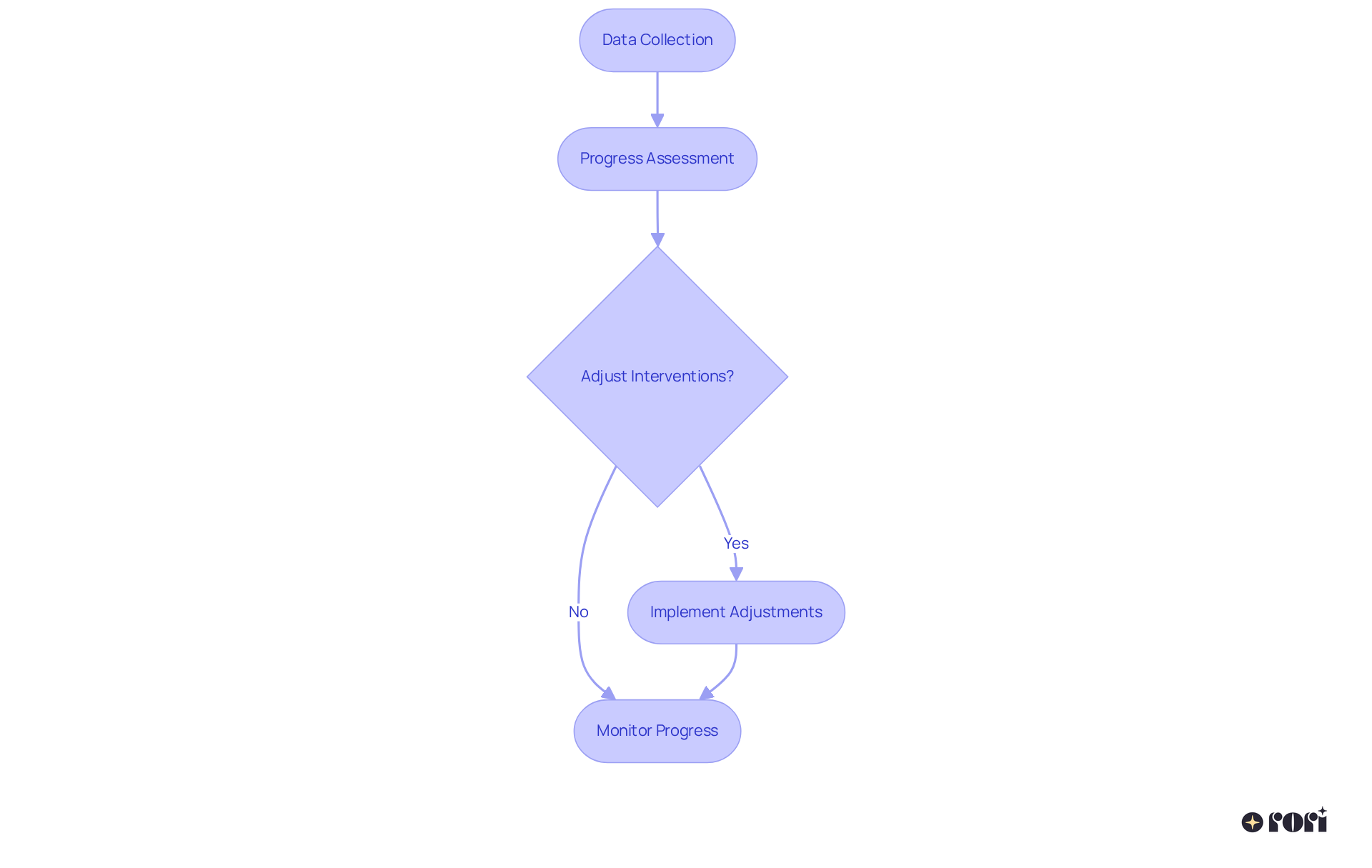
Ensuring quality school based ABA services in schools is all about having trained professionals who truly understand the principles of Applied Behavior Analysis. At Rori Care, we’re proud to have Board Certified Behavior Analysts (BCBAs) and Registered Behavior Technicians (RBTs) on our team. These experts bring the right skills to implement effective interventions that make a real difference.
They work closely with educators to create a supportive learning atmosphere tailored to the unique needs of each student. This collaboration not only fosters a sense of community but also enhances the overall effectiveness of school based ABA. Let’s explore this together and see how we can support every child’s journey!
The long-term benefits of ABA treatment go well beyond just immediate behavioral improvements. Research shows that kids who receive early and intensive ABA interventions often see significant gains in communication, social skills, and even academic performance. By teaching essential life skills and promoting independence, ABA therapy sets children up for success in many areas of life, like education, work, and friendships. This holistic approach makes sure that children with autism have the tools they need to thrive in their communities. Let’s explore this together!
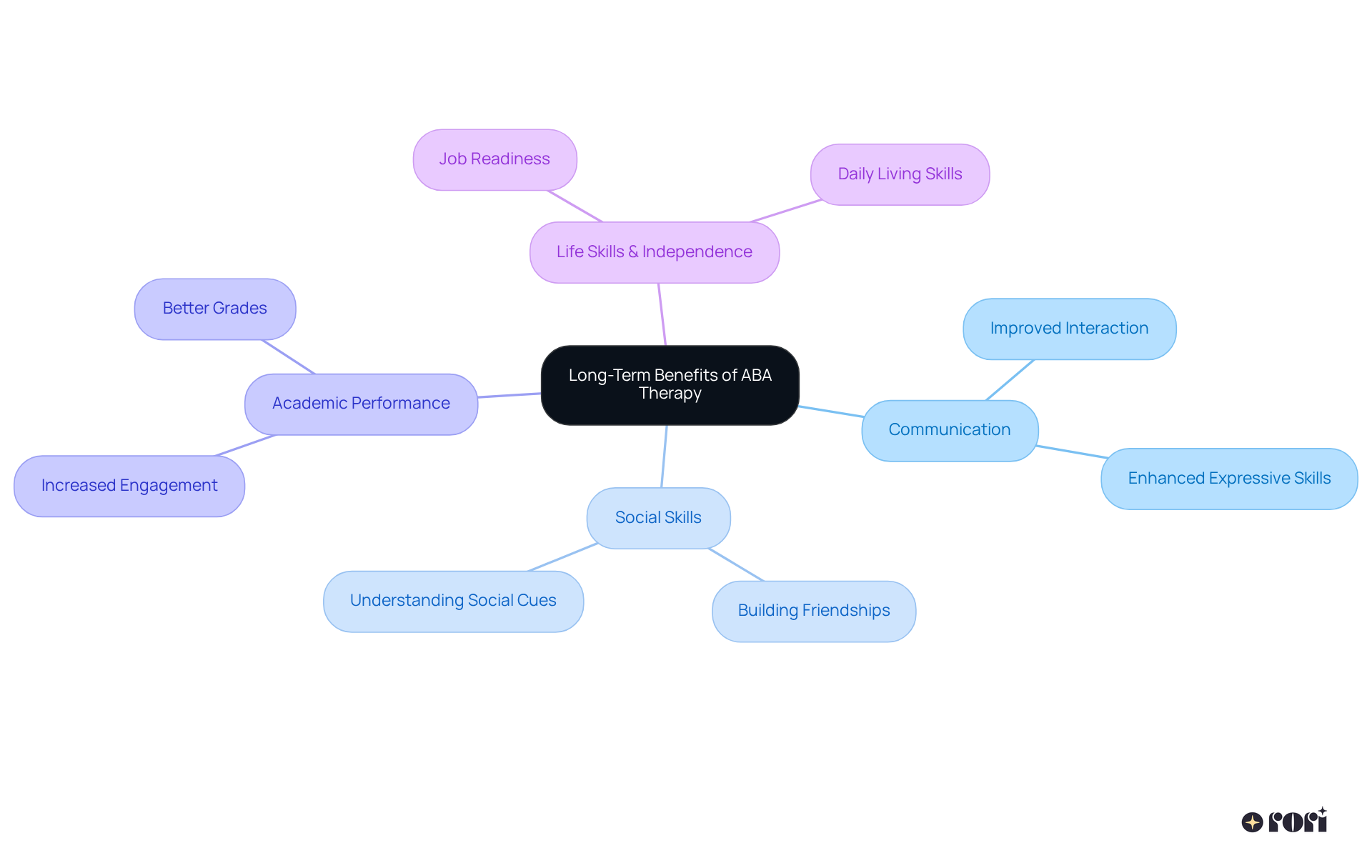
The transformative potential of school-based ABA therapy for children with autism is truly remarkable! This approach not only meets the immediate needs of students but also sets them up for future success. By integrating personalized treatment plans, skill development, and family involvement, school-based ABA ensures that children receive the comprehensive support they need to thrive both academically and socially.
Throughout this article, we’ve explored the many benefits of this therapy. From enhancing independence through targeted skill-building techniques to tackling behavioral challenges in school settings, the evidence shows that school-based ABA interventions lead to significant improvements in communication, social skills, and academic performance. The collaborative efforts of trained professionals, educators, and families create a nurturing environment that fosters growth and development.
Ultimately, embracing school-based ABA therapy isn’t just about addressing current challenges; it’s about preparing children for a brighter future. By investing in these evidence-based strategies, communities can empower young individuals with autism to navigate their educational journeys with confidence and success. So, let’s take action together: prioritize and advocate for comprehensive ABA support in schools to ensure that every child has the opportunity to flourish!
What is Rori Care's approach to supporting children with autism in schools?
Rori Care has developed a comprehensive school-based ABA program that blends data-informed approaches with a caring touch, aiming to create an inclusive learning environment where children can thrive academically and socially.
How does Rori Care ensure individualized support for each child?
Rori Care creates personalized treatment plans based on thorough evaluations of each child's unique strengths and challenges, focusing on specific behavioral goals to enhance engagement and foster meaningful progress.
What techniques are used in Rori Care's ABA therapy to promote skill development?
Techniques such as task analysis and positive reinforcement are utilized to break down complex tasks into manageable steps, helping children develop essential life skills like self-care and communication.
What are the benefits of early intervention in ABA therapy?
Early intervention can lead to significant cognitive improvements, enhance functional communication skills, and ultimately save about $1.3 million per person over their lifetime by reducing the need for long-term special education and intensive care.
How does Rori Care promote collaboration among therapists, educators, and families?
Rori Care emphasizes ongoing communication among therapists, educators, and families to ensure that each child's unique needs are met and to successfully implement school-based ABA strategies.
What outcomes can be expected from Rori Care's ABA therapy?
Children receiving ABA therapy through Rori Care often achieve better academic outcomes and develop essential life skills that prepare them for future success, leading to greater independence and a better quality of life.